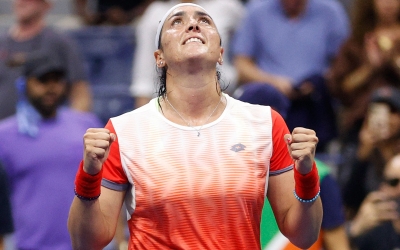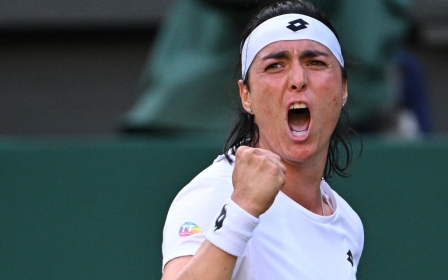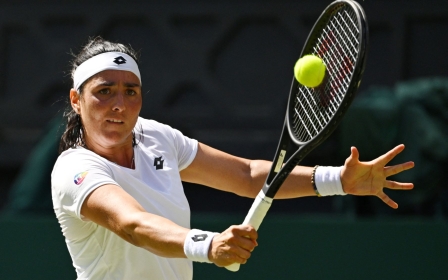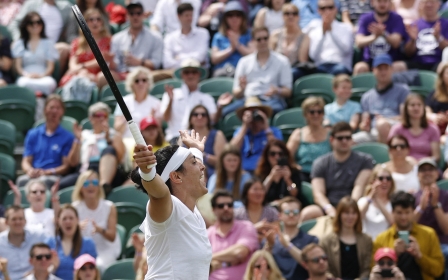Tunisia's Ons Jabeur: Unlucky again, but still an icon for Arabs and Africans
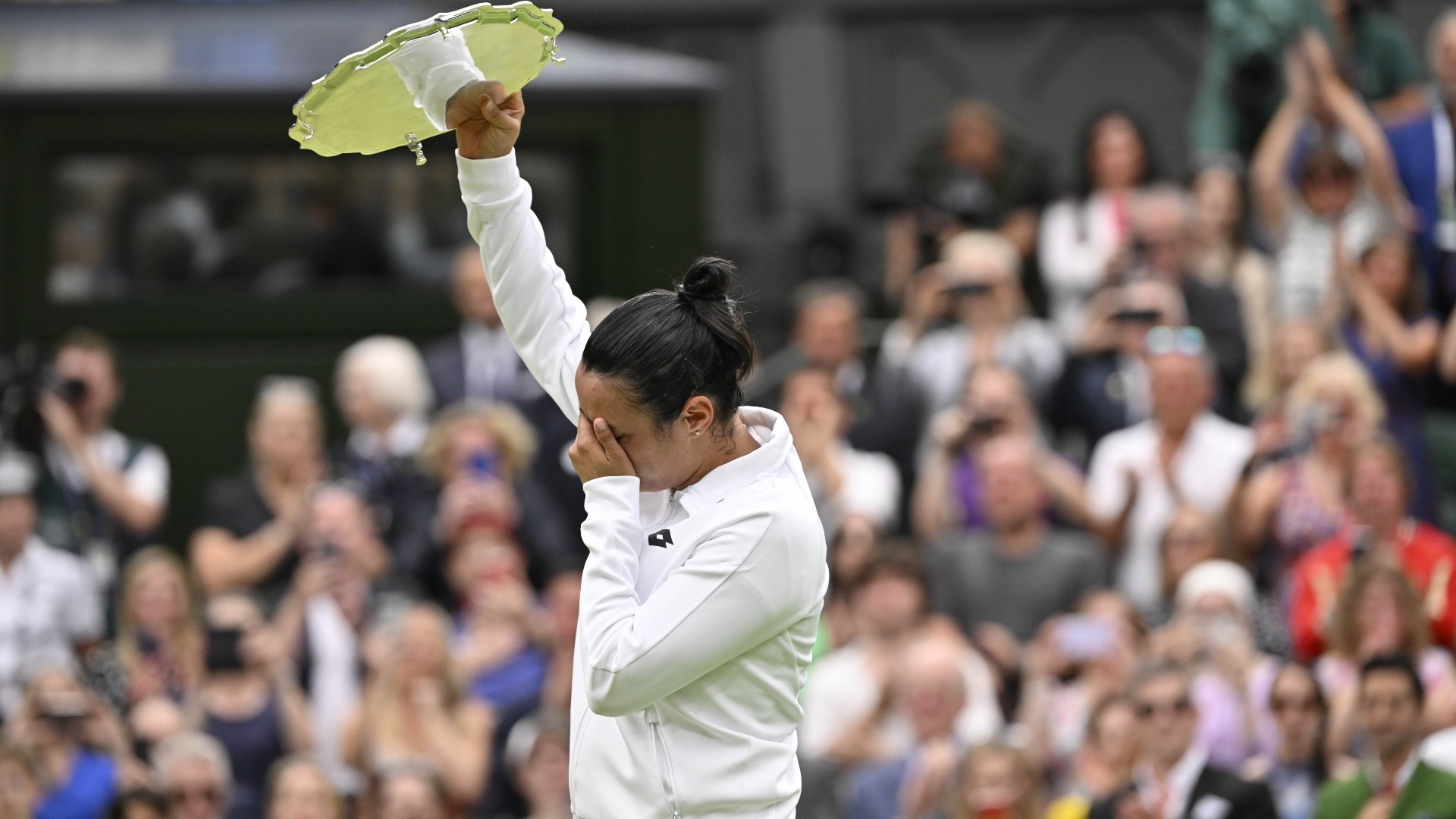
Ons Jabeur missed out on the chance to create history, falling at the final hurdle of the Wimbledon Championship, the oldest and most prestigious tennis tournament in the world. The wait for the first Arab and African tennis player to triumph at a major Grand Slam continues.
The Tunisian star, dubbed the "Minister of Happiness" for the joy she brings to her country and region, lost to the Czech player Marketa Vondrousova in Saturday’s final in straight sets (6-4, 6-4). In the process, Vondrousova became the first unseeded player to win the Wimbledon women's singles title.
Unfortunately for Jabeur, it wasn’t third time lucky - having suffered narrow defeats in the finals of Wimbledon and the US Open last year. Fans across Africa and the Middle East in particular had hoped Jabeur would this time achieve what her immense talent has promised since her breakthrough at the Australian Open in 2020, when she became the first Arab woman to reach a major quarter-final.
It was a hard-fought route to the final for the Wimbledon runner-up, coming back from a losing position in the quarter-final and semi-final. If she had recovered to win in the final, it would have been an unprecedented treble of comeback wins in the history of women’s tennis.
Yet there are plenty of positives on which to reflect despite losing the final. The 28-year-old captivated spectators at Wimbledon again this year, first and foremost with her entertaining play, magical forehand and deft drop shots.
New MEE newsletter: Jerusalem Dispatch
Sign up to get the latest insights and analysis on Israel-Palestine, alongside Turkey Unpacked and other MEE newsletters
Standing at a relatively diminutive 5ft 6in, Jabeur was unperturbed by more powerful opposition such as her semi-final opponent Aryna Sabalenka, the 6ft Belarussian with an average shot speed of 74mph.
Popularity and affection
But equally, it has been the North African star’s personality off the court that has earned her huge popularity and affection. Jabeur has shown herself to be a personable and media-friendly character, with thoughtful and often humorous interactions in post-game press conferences.
At Wimbledon, this is particularly significant, with widespread free-to-air coverage of the tournament to a huge TV audience in the UK. Perhaps even more importantly, the post-game on-court interviews after the quarter- and semi-finals have helped the world number two build a connection with the match-going fans.
Jabeur credited this connection with the Centre Court crowd for her comeback win against Sabalenka. The Tunisian thanked the 15,000-strong crowd for keeping her in the match when she was behind and for “cheering for me and believing in me”. She added that had it not been for their support, “maybe I’d have lost the match”.
However, for many observers, the most endearing trait is being unapologetically confident in her identity and positive about the communities she represents. The tennis star has come to embrace inspiring and bringing hope to millions of Arabs and Africans who look up to her as an example.
“I don’t see it as a burden, I see it as a great pleasure and great responsibility," she has said. "It’s part of the job, it’s part of why I am playing today.”
The Wimbledon runner-up describes herself as “a proud Tunisian woman” who wants to inspire more Arab and African players to enter the sport. The chief executive of the Confederation of African Tennis, Hichem Riani, told BBC Sport Africa before the final that as well as being a “social phenomenon” in Tunisia, Jabeur was inspiring all involved in African tennis.
“We all belong to one continent, and we are excited because it's amazing to see her on this stage," he said. "Africa is the future of tennis, of sports, of everything."
Hugely marketable asset
In the Open era, only one player representing an African nation has won a Grand Slam singles title - South African Johan Kriek at the 1981 Australian Open. (He won again the following year but by that time was representing the United States.)
However, it will surely only be a matter of time before Jabeur becomes the first African or Arab woman to win a final in the Open era and this defeat will not be the end of her story. She will doubtless continue to write new chapters and will find her place in the history books.
It will surely only be a matter of time before Jabeur becomes the first African or Arab woman to win a final in the Open era
The Tunisian’s success, as well as her background and personality, makes her a hugely marketable asset. Undoubtedly, brands and sponsors in the Middle East and more widely will want to leverage this, which will add to her fame and make her one of the most recognisable athletes in the world.
Last year, her sponsor Lotto Sport, the Italian sports equipment manufacturer, released merchandise inspired by the tennis trailblazer’s catchphrase "yalla habibi" (roughly "Let’s go, darling" in Arabic).
All the supporters and admirers that Jabeur has gained along the way through her magical tennis on the Wimbledon courts will know they have not seen the last of her.
The US Open awaits at the end of August. For now, the Minister of Happiness will need to reset and recover from this latest setback, but she will be back to doing what she does best very soon - spreading joy and hope to millions.
The views expressed in this article belong to the author and do not necessarily reflect the editorial policy of Middle East Eye.
Middle East Eye delivers independent and unrivalled coverage and analysis of the Middle East, North Africa and beyond. To learn more about republishing this content and the associated fees, please fill out this form. More about MEE can be found here.


